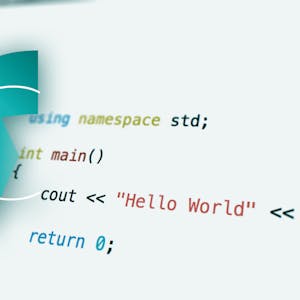Initiation à la programmation (en C++) is a comprehensive course that introduces the fundamental concepts of programming using the C++ language. This course is designed for individuals with no prior programming knowledge and covers a range of essential topics, including variables, loops, functions, arrays, strings, and pointers. The course is presented by École Polytechnique Fédérale de Lausanne and is structured to provide a thorough understanding of programming principles through various pedagogical elements.
The course is divided into several modules, each focusing on specific aspects of programming. From installation and introductory concepts to advanced topics such as pointers, references, and a practical case study, learners will gain a strong foundation in C++ programming. With a combination of instructional videos, quizzes, exercises, and automatically graded assignments, participants can engage with the course material in a dynamic and interactive manner.
By the end of the course, participants will have acquired the skills and knowledge necessary to write basic programs in C++ and will be well-prepared for advanced courses on object-oriented programming.
Certificate Available ✔
Get Started / More Info
The course modules cover a wide range of topics, starting with installation and introductory concepts, and progressing to advanced programming elements such as pointers, references, and a practical case study. Each module is designed to provide a comprehensive understanding of C++ programming.
The first module of the course focuses on the basics of programming, including installation instructions for different operating systems, introduction to variables, expressions, and the structure of the course. Learners will also engage in exercises and quizzes to reinforce their understanding of these fundamental concepts.
Module 2 delves into conditional control structures, covering branching conditions, boolean types, and related exercises. Participants will explore various conditional control scenarios and enhance their problem-solving skills through interactive exercises and quizzes.
Module 3 introduces iterations and loops, providing an in-depth understanding of loops, conditional loops, and block instructions. Learners will gain practical experience through exercises and quizzes, strengthening their grasp of iterative programming concepts.
Module 4 focuses on functions, including their introduction, usage, argument passing, prototypes, definitions, and methodologies. Participants will also explore default arguments, function overloading, and engage in exercises to reinforce their comprehension of function-based programming.
Module 5 explores arrays, including their declaration, initialization, utilization, specific functions, dynamic multidimensional arrays, and array-related exercises. Participants will gain practical knowledge of working with arrays and apply their skills in various exercises.
Module 6 covers strings and structures, including the introduction to string processing, type aliases, and structures. Participants will engage in exercises to solidify their understanding of working with strings, arrays, and structures in C++ programming.
Module 7 provides an introduction to pointers and references, covering their concepts, declaration, basic operators, dynamic allocation, and intelligent pointers. Learners will reinforce their understanding through exercises and practical applications of pointers and references.
The final module presents a case study focusing on the implementation of the game "Puissance 4" (Connect Four) in C++. Participants will explore various functions, code structure, and practical applications, gaining hands-on experience in implementing a real-world program.
Linear Algebra for Data Science Using Python introduces key foundational concepts and tools for using and analyzing large datasets, equipping learners with applied...
This comprehensive course explores computer hardware, software, networking, and the Internet, providing foundational knowledge for building and understanding computers....
Python Programming Fundamentals is an introductory course designed for beginners to gain a solid understanding of algorithmic thinking, Python syntax, code testing,...
This course offers a structured foundation for not-yet-experienced programmers to develop complex programs in computer science and data science using Python.